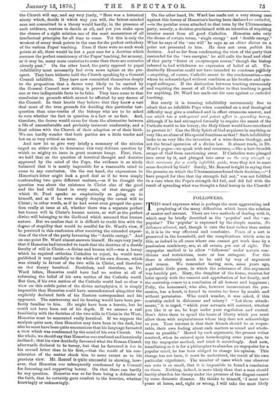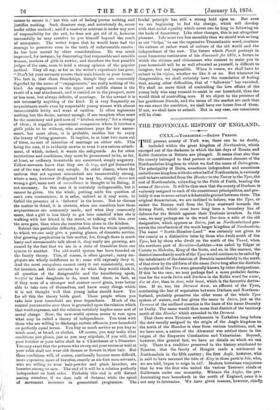FOLLOWERS.
THIS word expresses what is perhaps the most aggravating and perplexing of the many difficulties which beset the relation of master and servant. There are two methods of dealing with it,
which may be briefly described as the ' popular' and the ' un-
popular? The ' popular' is expressed by the simple maxim, No followers allowed, and, though it cuts the knot rather than unties
it, it is in its way effectual and conclusive. Peace of a sort is preserved in the household, and the complications which arise in this, as indeed in all cases where one cannot get work done by a passionless machinery, are, at all events, put out of sight. The unpopular method is to allow " followers" under certain con-
ditions and restrictions, more or less stringent. For this there is obviously much to be said by way of argument and reason. We remember having seen, some years ago, a pathetic little poem, in which the substance of this argument was forcibly put. Mary, the daughter of the house, receives her loier openly with the consent and approbation of her family, and the courtship comes to a conclusion of all honour and happiness ; Polly, the housemaid, who also, however inconvenient the pos- session, has a heart, is forced to receive her lover by stealth and without permission. Who could wonder, it was asked, if this courtship ended in dishonour and misery ? " Let these attach- ments," it is urged, " which your servants will contract, whether you like it or no, be kept under your regulation and control. Don't drive them to spend the hours of liberty which you must allow them with acquaintances whom they dare not acknowledge to you. Your interest is that their friends should be as respec- table, their own feeling about such matters as sound and whole- some as possible." Moved by such arguments, the present writer resolved, when he entered upon housekeeping some years ago, to try the unpopular method, and tried it accordingly. And now, humiliating as it is for a philosopher to abandon an unpopular for a popular creed, he has been obliged to change his opinion. This change has not been, it must be understood, the result of his own particular experience. The number of cases which one observer can note is so small, that it is impossible to found a conclusion on them. Nothing, indeed, is more likely than that a man should hastily abandon his theory under the pressure of the disgust caused by some domestic disaster. He thinks to himself, 61 must have peace at home, and, right or wrong, I will take the most likely
means to secure it ;' but this sort of feeling proves nothing and justifies nothing. Such disasters may, and notoriously do, occur under either method ; and if a master or mistress is under any sort of responsibility for the evil, he does not get rid of it, however successfully he may contrive to put himself beyond the reach of annoyance. The writer hopes that he would have had the courage to persevere even in the teeth of unfavourable results ; he has been moved by other considerations. Ile was much impressed, for instance, by discovering that responsible and sensible women, mothers of girls in service, and therefore the best possible judges of the case, seem to hold a strong opinion of the popular method. They all say, as far as the writer's experience has gone, " Don't let your servants receive their male friends in your house." The fact is, that these friendships, though they are commonly dignified by the name of "engagements," are really nothing of the kind. An engagement in the upper and middle classes is the result of a real attachment, and is carried on in the prospect, more or leas near, but always definite, of marriage. In the servant it is not necessarily anything of the kind. It is very frequently an acquaintance made even by respectable young women with almost inconceivable levity and want of caution. It often represents nothing but the desire, natural enough, if one imagines what must be the monotony and pettiness of "kitchen society," for a change of ideas ; it supplies a convenient companion whom it touches a girl's pride to be without, who sometimes pays for her amuse- ment, but more often, it is probable, enables her to enjoy the luxury of being generous. It implies, in at least two cases out of three, no sort of intention of marriage on either side. This being the case, it is evidently unwise to treat it as a serious attach- ment, of which, indeed, it wants the safeguards. As for other restrictions and conditions, they must be pronounced to be, as far, at least, as ordinary households are concerned, simply nugatory. Fellow-servants know that they are de trop, and get themselves out of the way without any scruple. In other classes, where the motives that act against misconduct are inconceivably strong, where a man, however ill-disposed he may be, simply dares not wrong a girl, some sort of surveillance is thought to be fitting, if not necessary. In this case it is certainly indispensable, but it cannot be given. On the whole, putting aside the question of one's own convenience, it is safer, unkind as it may seem, to forbid the presence of a follower' in the house. Not to discuss the matter in detail, it is obvious, when one considers how these acquaintances are commonly made, and what they commonly mean, that a girl is less likely to get into mischief when she is walking with her friend in the street, or talking with him over the area gate, than when she receives him alone in the kitchen.
Behind this particular difficulty, indeed, lies the whole question, to which we can only give a passing glance, of domestic service. Our growing perplexities in this matter, for, though there is much hasty and unreasonable talk about it, they really are growing, are caused by the fact that we are in a state of transition from one system to another. The old-world system has been founded on the family theory. This, of course, is often ignored ; many em- ployers are wholly indifferent to it ; some will expressly deny it. And the most scrupulous cannot carry it out consistently, must, for instance, ask their servants to do what they would think it, all question of the disagreeable and the humiliating apart, hurtful to their daughters to do, must treat' them, in feet, as if they were of a stronger and coarser moral grain, were better able to take care of themselves, and knew many things which it is not thought well that young ladies should know. Yet for all this the theory holds good. These people whom you take into your household are your dependents. Much of the control you exercise over them is grounded upon the relation which that word expresses, and the relation certainly implies some sort of moral charge. Now, the new-world system seems to rest upon what may be called a theory of independence. You treat with those who are willing to discharge certain offices in your household on perfectly equal terms. You buy so much service as you buy so much meat, or bread, or clothes. Of course, you may make what conditions you please, just as you may stipulate, if you will, that your butcher or your tailor shall be a Churchman or a Dissenter. You may exact that the persons who sweep out your rooms or wait at your table shall not wear silk dresses or flowers in their hair. But these conditions will, of course, continually become more difficult, more expensive, more of luxuries, exactly as six-foot men-servants, who are willing to wear hair-powder and plush breeches, are luxuries among us now. The end of it will be a relation perfectly independent on both sides. Probably this end is still distant among ourselves, if we dare talk of distance while the speed of movement increases in geometrical progression. The
feudal principle has still a strong hold upon us. But even we are beginning to feel the change, which will develop with that social equality which never can be long in following on the heels of democracy. Like other changes, this is not altogether pleasant. Life must run less smoothly than we should wish as long as our "helps," to use the expressive Transatlantic word, combine the culture or rather want of culture of the old world and the independence of the new. The future which Punch portrays in some humorous caricatures of his Almanack for 1870, a future in which the citizens and citizenesses who consent to assist you in your household will be as well educated as yourself, is difficult to imagine, but not impossible. When it comes, we shall have to submit to its regime, whether we like it or no. But whatever its disagreeables, we shall certainly have the consolation of feeling that, among other difficulties, that of " followers" has vanished. We shall no more think of controlling the love affairs of the. young lady who may consent to assist in our household, than she would think of controlling ours. If we object to the presence of her gentlemen friends, and the terms of the market are such that we can exact the condition, we shall have our house free of them- If not, we shall have to submit. But in any case, our conscience. will be clear.































 Previous page
Previous page